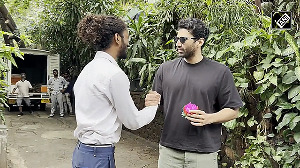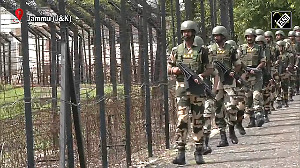The retired American general who delivered an alleged memo that sought United States help to stave off a feared coup in Pakistan has said that he believes the document was "not credible".
Former US National Security Advisor, Gen (retired) James Jones has said in an affidavit submitted to the Supreme Court that he delivered the memo to former US military chief Admiral Mike Mullen on May 10 on behalf of Pakistani-American businessman Mansoor Ijaz.
Jones said Ijaz had told him that the memo contained a message from the "highest authority" in the Pakistan government. However, Jones said he was not convinced about the memo's credibility and that Ijaz had never said he was acting on the directions of Husain Haqqani, Pakistan's former envoy to the US.
"Upon my reading of the memo that I was asked to forward to Admiral Mullen, it struck me as highly unusual that the 'highest authority' in the Pakistan government would use Ijaz, a private citizen and part-time journalist living in Europe, as a conduit for this communication. My personal opinion was that the memo was probably not credible," Jones said.
Jones submitted the affidavit dated December 12 to Haqqani's lawyer. The former envoy is at the centre of a probe being conducted by Pakistan's Supreme Court into the memogate scandal and his legal team has submitted the affidavit in court and will use it to strengthen his claim that he had played no role in drafting or delivering the memo.
In the affidavit, Jones said he "was in private life" at the time when the memo was handed over to Admiral Mullen. He acknowledged that he had known Ijaz "in a personal capacity since 2006."
Referring to a phone conversation with Ijaz, Jones said, "At no time during the call do I remember Ijaz mentioning Ambassador Haqqani, and he gave me no reason to believe that he was acting at the direction of Ambassador Haqqani, with his participation, or that Ambassador Haqqani had knowledge of the call or the contents of the message."
The unsigned memo emailed by Ijaz "was not marked classified or restricted" and its contents were "similar in nature to the phone call I had with Ijaz," Jones said in the affidavit.
"It was my assumption that the memo was written by Ijaz, since the memo essentially put into writing the language he had used in our telephone conversation earlier," he stated. "I have no reason to believe that Ambassador Haqqani had any role in the creation of the memo, nor that he had any prior knowledge of the memo."
Jones said he emailed the memo to Mullen on May 10. "It is my understanding from Admiral Mullen's public statement on the matter that he reviewed the memo, did not find it credible, and did not take any action," he said.
Army chief Gen Ashfaq Parvez Kayani and Inter-Services Intelligence agency chief Lt Gen Ahmed Shuja Pasha have, in replies submitted to the Supreme Court, sought a probe into the memo and said they were satisfied with the evidence provided by Ijaz.
However, the government had asked the apex court on Thursday to dismiss petitions seeking an investigation into the memo, saying the Parliamentary Committee on National Security had already been asked to conduct an inquiry into the matter.





